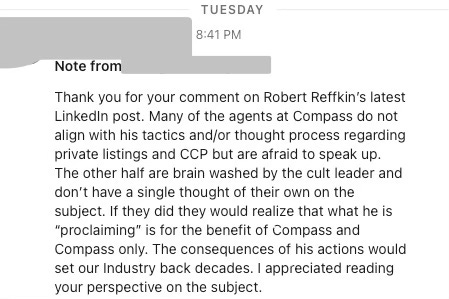MCAI AI Lex Vision: When Antitrust Becomes Theater — The Compass Playbook, Exposed
Compass Litigation as Market Strategy in Real Estate's Platform Wars
See also MindCast AI Lex Vision: Brief of MindCast AI LLC as Amicus Curiae in Support of Defendant Zillow,UNITED STATES DISTRICT COURT FOR THE SOUTHERN DISTRICT OF NEW YORK Case No. 1:25-cv-05425
I. The Pattern Beneath the Legal Claims
As detailed in the companion analysis, “Compass is Not a Tech Firm,” the company’s self-branding as a tech innovator masks its core strategy: traditional brokerage dominance cloaked in exclusivity, opacity, and litigation-driven leverage (giving rise to the #distrustcompass movement).
Compass has filed two high-profile lawsuits in 2025—first against the Northwest Multiple Listing Service (NWMLS), and then against Zillow. At first glance, these appear to be separate antitrust cases. In reality, they form a coherent pattern: Compass is attempting to reshape real estate’s competitive infrastructure through litigation, narrative inversion, and selective appeals to consumer welfare. This vision statement analyzes both lawsuits to reveal the deeper strategy at play.
In both cases, Compass casts itself as a market underdog—a progressive innovator allegedly restrained by legacy institutions (NWMLS) or dominant platforms (Zillow). But that story conceals a more complex truth: Compass is not being excluded. Rather, it seeks to change the rules to entrench its own gatekeeping strategies. This is not consumer protection. It is platform warfare.
The legal framing is classic antitrust: access denial, competition stifling, market control. But the behavioral pattern is media-savvy: litigate, publicize, and reframe. Compass aims not just to win in court—it aims to build a regulatory moat.
Terms like “transparency,” “choice,” and “freedom” are weaponized to advance a strategy that in practice reduces all three for consumers and competitors alike. This is the heart of Compass’s narrative inversion—accusing others of the very behavior it institutionalizes.
II. Lawsuit 1 — Compass vs. NWMLS
Compass’s suit against NWMLS targets cooperative compensation rules and data-sharing restrictions, calling them outdated and anticompetitive. But this argument is misleading. NWMLS is a pro-competitive structure designed to ensure shared access and lower barriers to entry.
Compass, meanwhile, profits from those rules while refusing to operate by them. Its "Private Exclusive" listings restrict inventory visibility—only accessible to Compass insiders or clients. Compass wants the benefits of MLS access without the burden of reciprocity.
This lawsuit is not about freeing the market. It is about destabilizing open infrastructure to elevate Compass’s proprietary system. The irony is that Compass frames this as increasing consumer choice while actively reducing public visibility into listings.
The broader risk is structural. If Compass succeeds, MLS systems could be gutted, leaving smaller firms without the scale or tech stack to compete. The result would be market fragmentation and deepened inequality across brokerages.
III. Lawsuit 2 — Compass vs. Zillow
The lawsuit against Zillow repeats the same pattern: claim innovation, mask control. Zillow’s “24-hour exclusivity” rule is meant to keep listings public, searchable, and equally accessible. Compass interprets this as an attack—because it disrupts Compass’s ability to gate listings.
Here, Compass flips the narrative again. It claims Zillow and its affiliates are suppressing competition by enforcing standards. But Compass itself practices exclusion through physical-only access and selective visibility. The logic is circular: any rule that blocks exclusivity is branded as exclusionary.
Compass also alleges collusion between Zillow, Redfin, and eXp. But those firms are simply enforcing shared protocols that promote access. Compass resists any standard it doesn’t control. In that sense, the Zillow lawsuit is less about listing access and more about power—who sets the rules, and who must follow them.
If Compass wins here, other platforms may hesitate to enforce listing visibility standards. That would undermine transparency industry-wide—and normalize exclusive inventory walls.
The Fear Index: When Agents Speak in Whispers
This message was sent to me privately after I commented on Robert Reffkin’s LinkedIn post. It reflects a pattern I’ve seen repeatedly: silent dissent, reputational fear, and disillusionment inside Compass. For their protection, I’ve redacted the sender’s identity — but their words speak volumes.
IV. The Vision Behind the Strategy
For a deeper examination of Compass’s strategic use of litigation and platform control, see “Compass is Not a Tech Firm, Part II: Market Capture by Design,” which outlines how Compass uses regulatory fog and asymmetric access as deliberate tools of market domination.
These lawsuits, taken together, expose Compass’s broader market strategy:
Narrative Inversion — Reframe transparency rules as anticompetitive while hoarding private access.
Platform Jujitsu — Feed off open systems (MLS, Zillow) while exempting itself from similar standards.
Antitrust Theater — Use litigation not to promote fairness, but to discredit the gatekeepers Compass cannot control.
Legal Intimidation as Leverage — Deploy lawsuits to stall reform, exhaust competitors, and fog regulators.
These tactics are not new—but they are unusually refined. Compass has crafted a litigation-first approach to competitive dominance, cloaked in the language of progress and reform.
The danger isn’t just what Compass claims in court—it’s how those claims are received. If courts accept Compass’s inversion at face value, they risk eroding the very institutions designed to ensure open markets.
Real estate will not remain neutral. It will either consolidate into branded exclusivity systems or preserve a decentralized, shared-access model. The legal outcomes of these cases may determine which path wins.
This is not a company seeking fairness. This is a company scripting control. And the industry must choose its role: audience, participant, or opposition.






